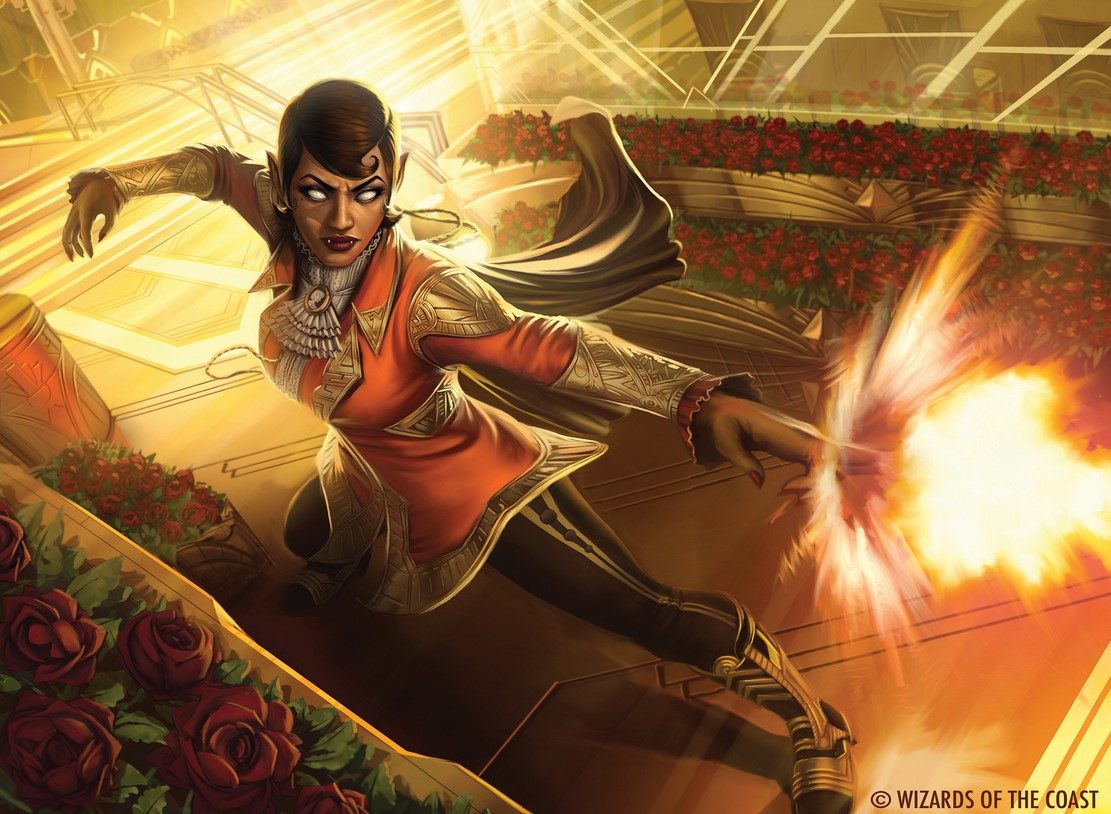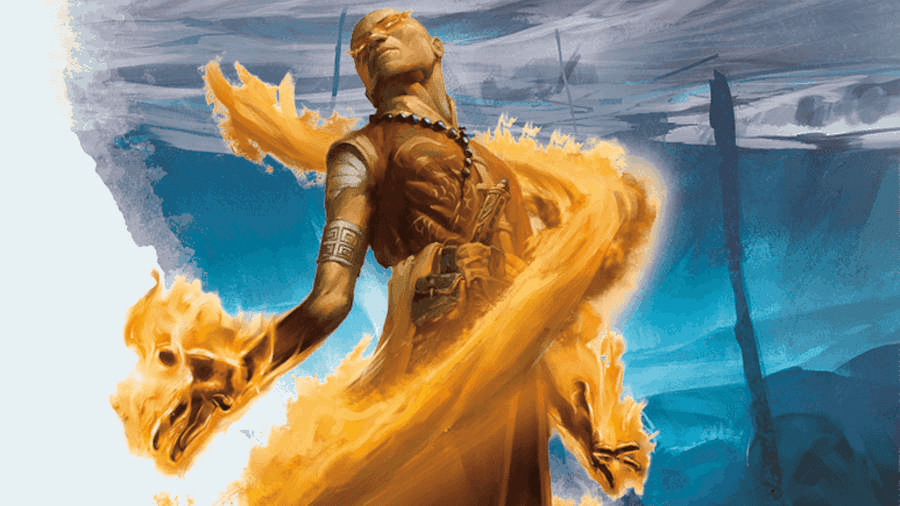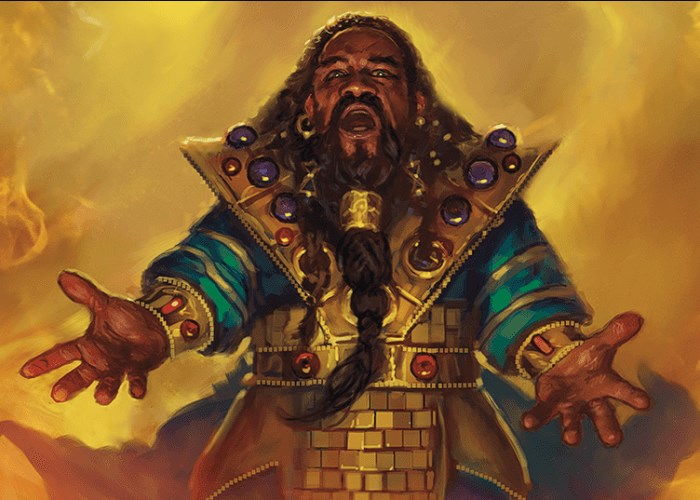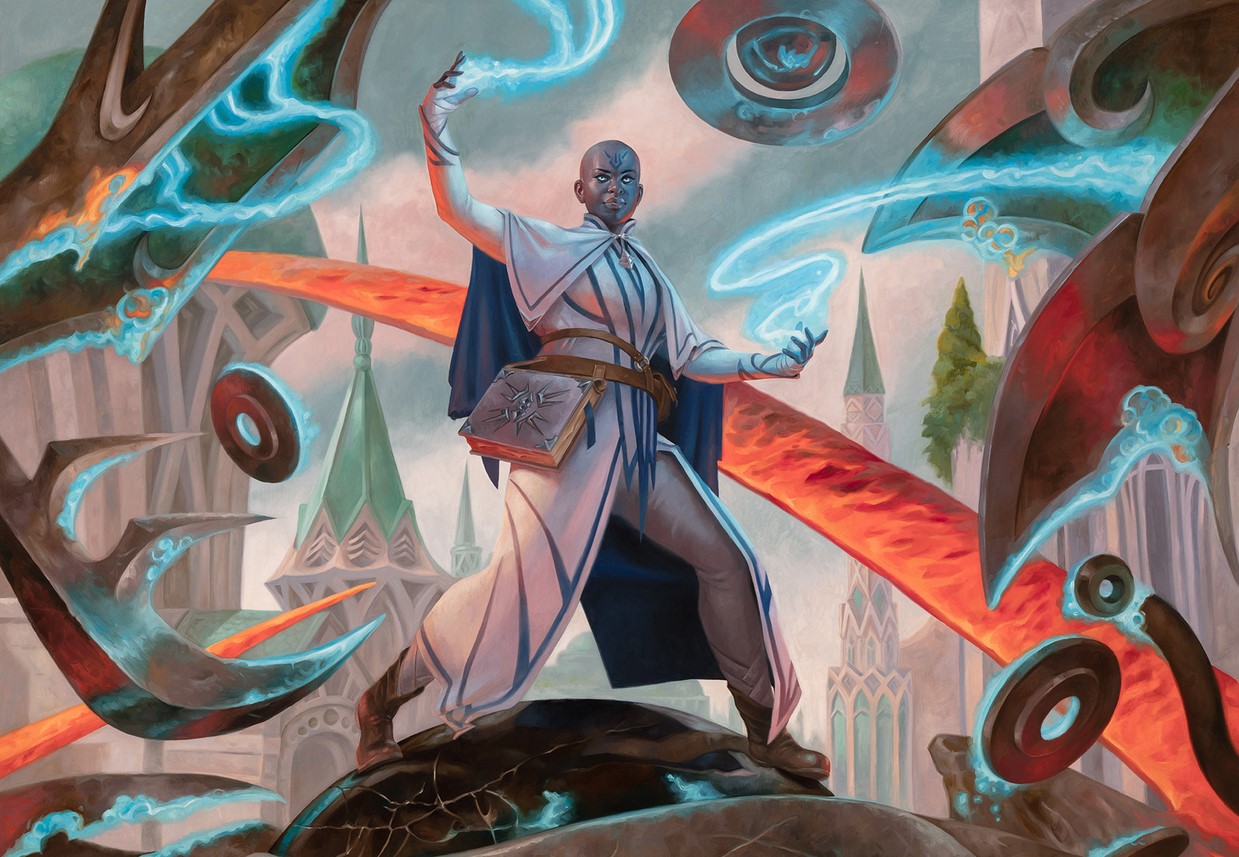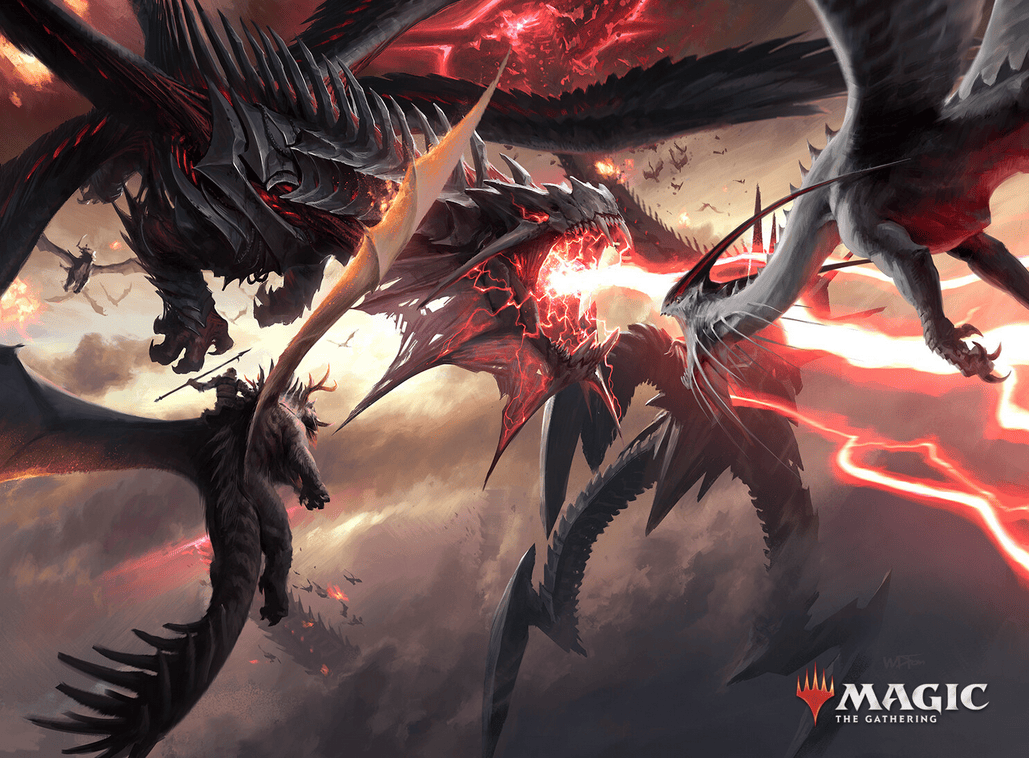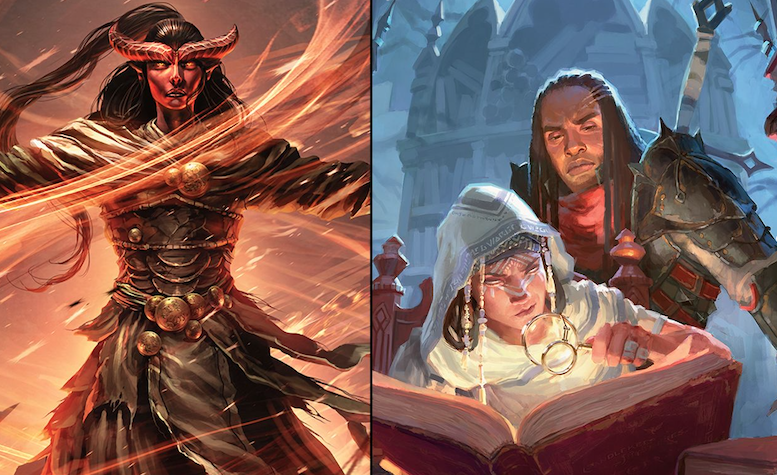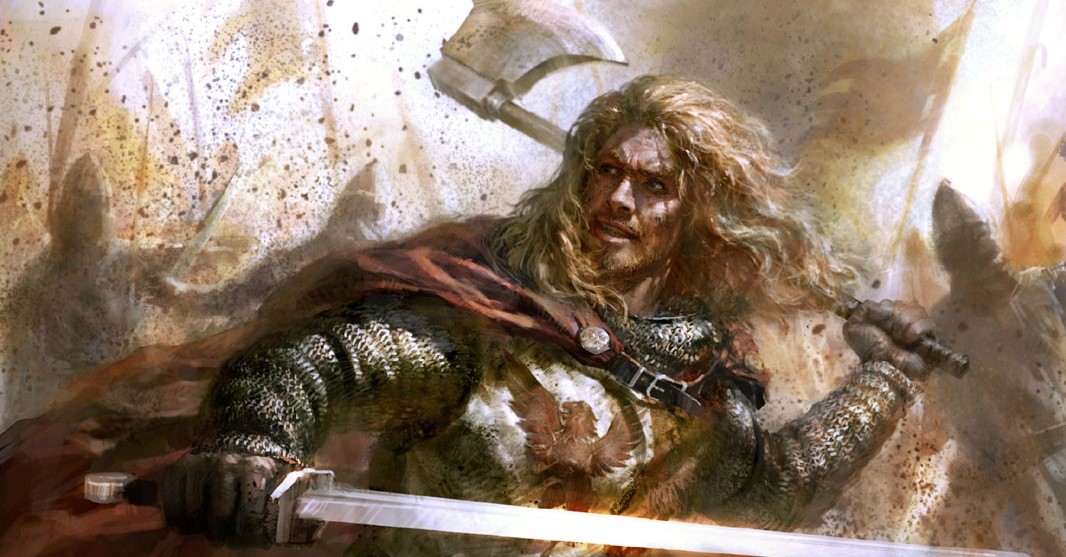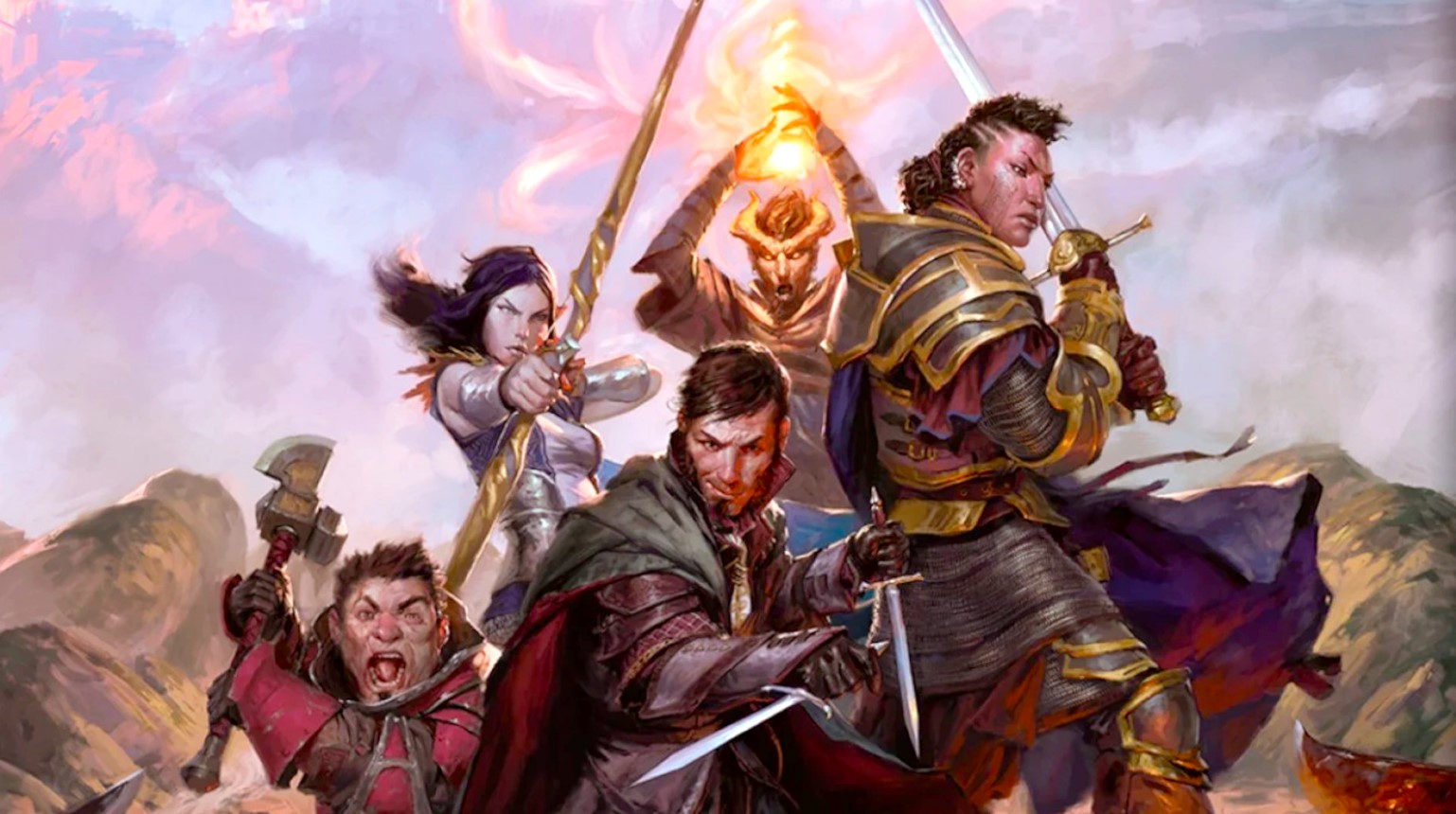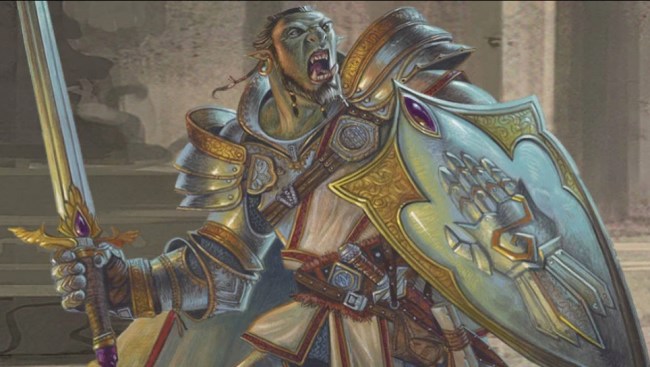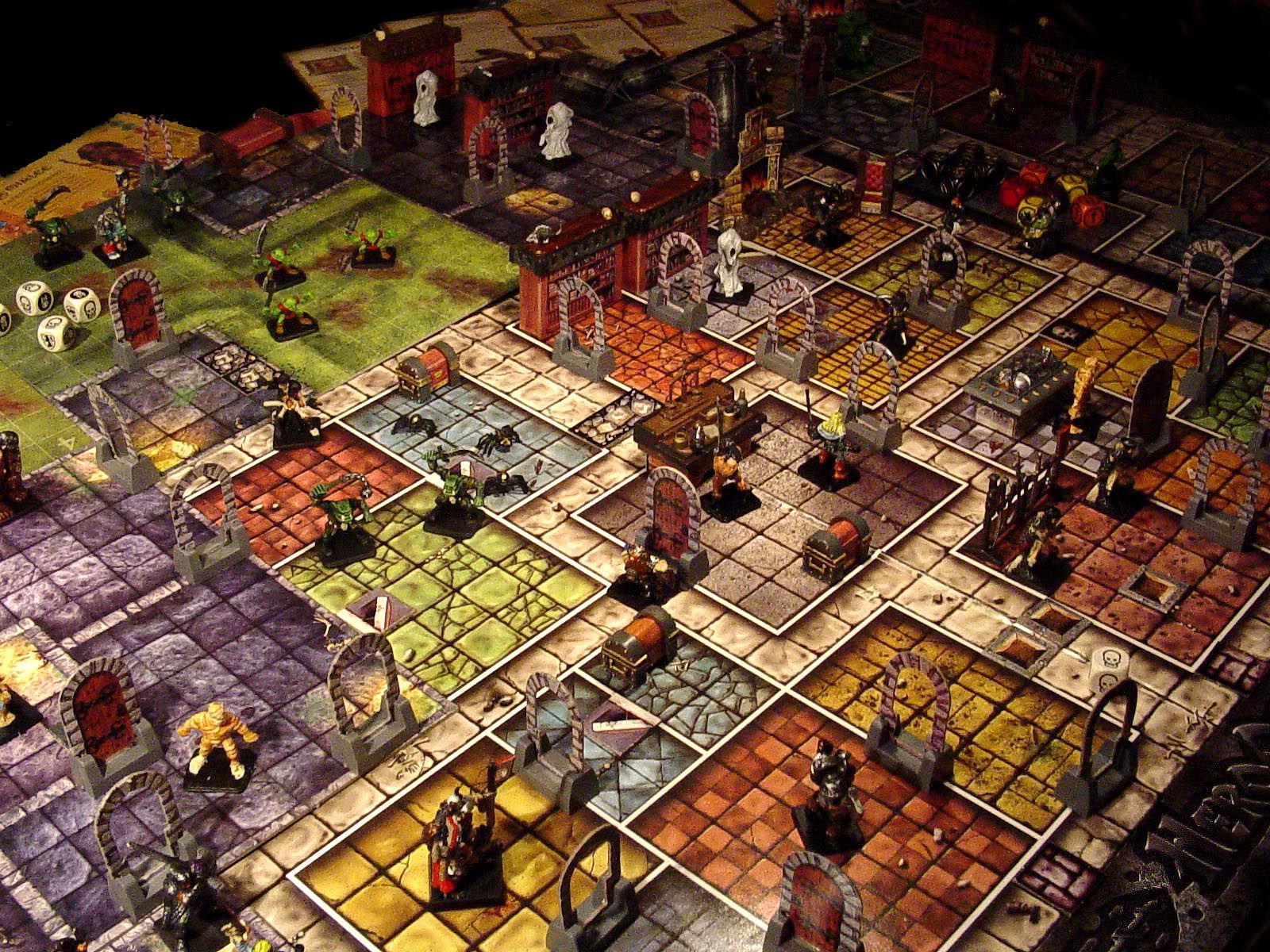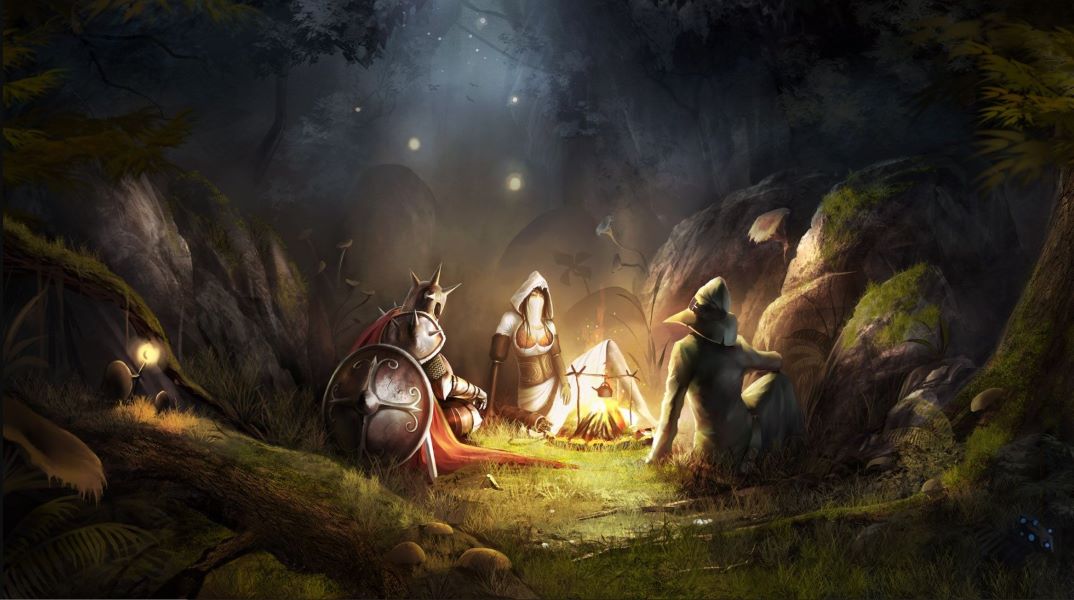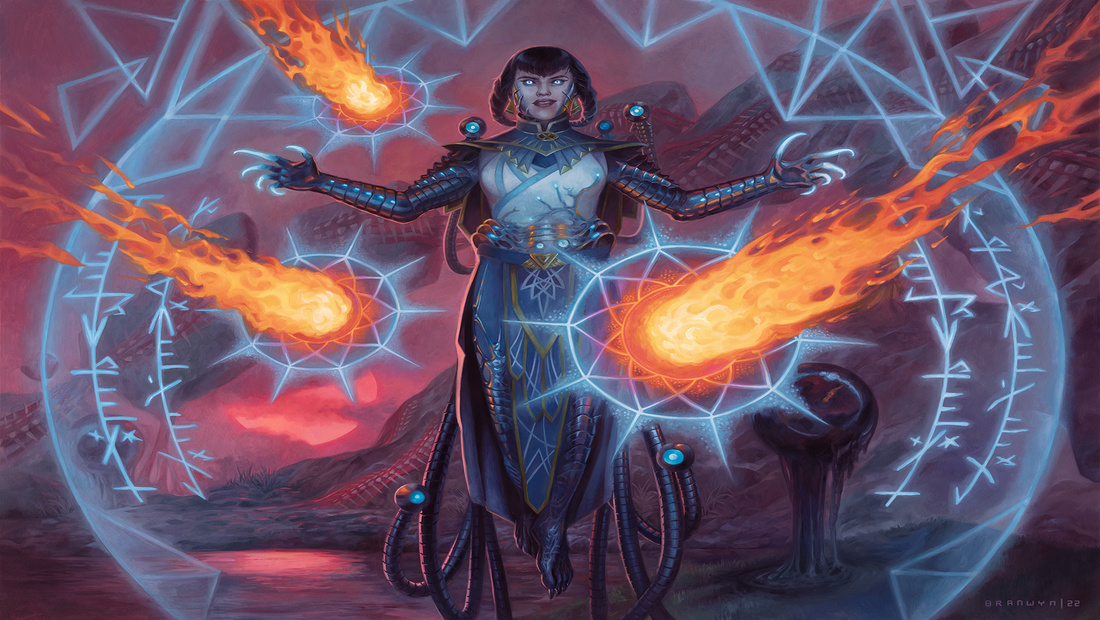
Welcome to the underworld! You’re a rogue, you’re ready to kick some ass, and you’re not sure which feat to choose. Luckily for you, you’ve joined the right guild! See this door? Simply knock 3, 2, 1, and then 2 times, and our guildmaster will guide you through the basics. Go make your new crime family proud!
10. Dungeon Delver
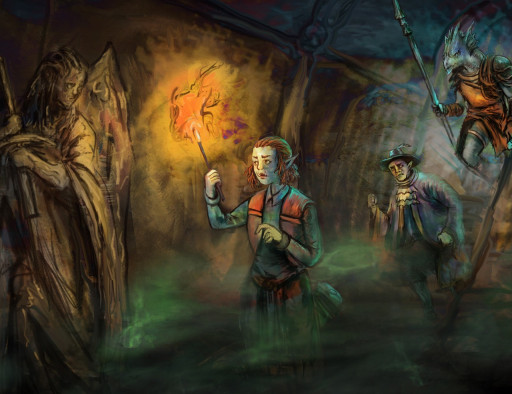
Going Deeper. Art by EN World / EN Publishing.
Source: Player's Handbook
- Alert to the hidden traps and secret doors found in many dungeons, you gain the following benefits:
- You have advantage on Wisdom (Perception) and Intelligence (Investigation) checks made to detect the presence of secret doors.
- You have advantage on saving throws made to avoid or resist traps.
- You have resistance to the damage dealt by traps.
- Traveling at a fast pace doesn't impose the normal -5 penalty on your passive Wisdom (Perception) score
Once the party falls for a trapped or secret door once, every door becomes a risk of death. And for good reason - traps and secret doors are key features of any good dungeon!
As the Rogue, you’re the resident trap- and door- expert. You’re most likely the one with the best sleight of hand. And you’ll be the lockpick anyways, so you may as well check it for traps while you’re at it.
With this feat, you’re taking this key aspect of your party role and giving it a level-up. And, you’re protecting yourself in the process! There’s not much worse than a trap blowing it up in your face because you rolled a nat 1 to disable it.
Why Dungeon Delver Is Great For Rogue:
- More Doors For You: More secret doors = more opportunities to pick them, more chances to crack their traps, and - best of all - more treasure!
- Safer De-Trapping: Being the default trap-checker is like being on the bomb squad. No matter how good you are at it, there’s always a chance it can kill you. If you find yourself doing this often - as most rogues do - you’ll want the bomb suit to keep you safe(r) if it does go off.
- Rushing =/= obliviousness. So you’re running away. Or you’re giving chase. Or simply operating on a very tight schedule, with an important deadline waaaay too close for comfort. You know what would really suck? Getting ambushed now, of all times. Prevent that with this feat.
9. Fighting Initiate
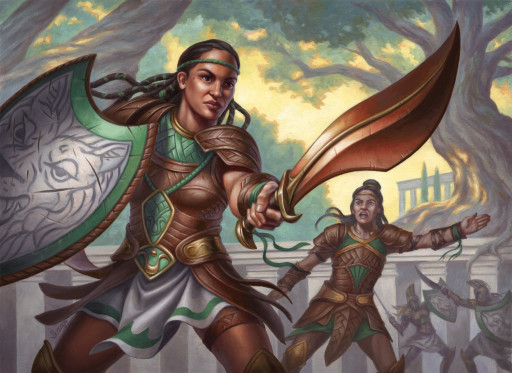
Ready for any attack. Art by Scott Murphy.
Source: Tasha's Cauldron of Everything
- Prerequisite: Proficiency with a martial weapon
- Your martial training has helped you develop a particular style of fighting. As a result, you learn one Fighting Style option of your choice from the fighter class. If you already have a style, the one you choose must be different.
- Whenever you reach a level that grants the Ability Score Improvement feature, you can replace this feat's fighting style with another one from the fighter class that you don't have.
Rogue is a martial class- they rely on physical prowess over magic. Fighting Initiate allows you to take a bonus from fighter - *the* martial class - for yourself. It’s a pretty vanilla bonus, but can go a long way in your overall effectiveness in combat.
There are many fighting styles to choose from. The three best suited for rogues are Archery, Blind Fighting, and Two-Weapon Fighting.
Archery gives you a +2 to attack rolls made with ranged weapons. Sneak attack - the primary DPS feature of the rogue class - relies on landing your attacks. So Archery is great if you’re a distance-based rogue, firing off shots from the shadows. It really ups your overall chances to hit, and therefore your chances to land a devastating Sneak Attack.
Blind Fighting is a little more situational, but still can be useful. With it, you get blindsight up to 10 feet. This allows you to see invisible enemies of course, but has an even better benefit for rogues.
Let’s say, for instance, that you’re fighting in a heavily obscured area, like a fog cloud, or magical darkness. Normally, this blinds you. Being blinded gives you disadvantage on attack rolls, and your enemies get advantage on attack rolls against you.
Now let’s say you have blindsight, and your enemy is also in the cloud. Suddenly, you’re able to attack them at advantage instead of disadvantage, and attack rolls against you aren’t at advantage! You’ve turned a mutually difficult situation into one where you have a significant upper hand.
Finally, Two-Weapon Fighting. Normally when you fight with two weapons, your second weapon’s attack doesn’t add your ability modifier to the damage of the second attack. The Two-Weapon Fighting fighting style changes that.
As I’ve mentioned before, Sneak Attack is the primary feature of this class. So, you’re most likely trying to swing as many times as possible each round, to get the highest chances of landing a hit for Sneak Attack. So if you’re already wielding two weapons, this adds a nice little damage bonus to your hits.
Basically all the other fighting styles either don’t go well with rogue abilities, or actively limit them. Dueling, for example, gives you a +2 to damage rolls with a weapon if it’s the only one you’re wielding, and it’s in one hand. If you’ve been paying attention, you know that as a rogue, you’ll probably want to have another weapon out in combat. So this is a no-go.
Why Fighting Initiate Is Great For Rogue:
- Increased chances to hit: For rogues, hitting means doing sneak attack damage (most of the time). Hit more = do sneak attack more often = be the freaking awesome ninja/pirate/thief you’re trying to be.
- More chances for having advantage on the attack: Again, advantage on the attack opens up sneak attack as an option. Not just for the increased chance to hit, but because it’s literally needed before you can use sneak attack.
- Add even more damage to your hits: You’re already attacking with your off-hand. Go ahead and give your second strike that nice little damage boost! It will add up over time.
8. Crossbow Expert
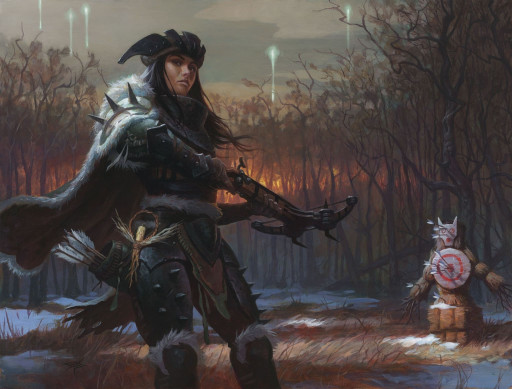
Put your bolt wherever you want to. Art by Steve Prescott.
Source: Player's Handbook
- Thanks to extensive practice with the crossbow, you gain the following benefits:
- You ignore the loading quality of crossbows with which you are proficient.
- Being within 5 feet of a hostile creature doesn’t impose disadvantage on your ranged attack rolls.
- When you use the Attack action and attack with a one handed weapon, you can use a bonus action to attack with a hand crossbow you are holding.
This feat is specifically for the crossbow wielding rogues. Hand crossbows are a starting proficiency, so this can be a great route for our ranged-fighting friends.
By ignoring the loading property of crossbows, you get to fire them multiple times in one turn. Normally, loading limits you to one attack per action.
Add on top of that the fact that hand crossbows are one handed weapons, and you get the joyful image of bursting through a window, firing off your dual-wielded hand crossbows as you fly through the air matrix-style. Or simply that you can now make 2 attacks each round using 1d6 base damage, instead of a dagger’s 1d4.
Finally, you get to ignore the disadvantage of being too close to an enemy. One of the factors for getting sneak attack without advantage, is that you can’t be at disadvantage. So this is yet another way to increase the number of chances for sneak attack!
Why Crossbow Expert Is Great For Rogue:
- Matrix Badassery: Double crossbows feels like the D&D Equivalent of Double AKs. Plus that’s twice the chances of ranged sneak attack!
- Higher damage output for ranged rogues: Turn those dagger 1d4s into hand crossbow 1d6s, and relish in your even better DPS.
- More sneak attacks: Even when you’re right next to the enemy, you can still fire off that hand crossbow and get your sneak attack glory.
7. Sharpshooter

You ain’t safe till you’re dead. Art by Nikita Volobuev.
Source: Player's Handbook
- You have mastered ranged weapons and can make shots that others find impossible. You gain the following benefits:
- Attacking at long range doesn't impose disadvantage on your ranged weapon attack rolls.
- Your ranged weapon attacks ignore half and three-quarters cover.
- Before you make an attack with a ranged weapon that you are proficient with, you can choose to take a -5 penalty to the attack roll. If that attack hits, you add +10 to the attack's damage.
Speaking of ranged sneak attack glory, Sharpshooter is another feat that helps you achieve this.
Losing the disadvantage at long range means you can keep firing off sneak attacks from your sniper’s nest - even while your prey is fleeing. Ignoring half and three-quarters cover means your prey can try to duck or hide, but even that won’t stop the infallible force that is you.
Plus, you can potentially add another +10 to your damage. This is the equivalent of adding almost 3 more d6 (on average) to your damage output!
The one catch is you take a -5 to the attack roll, so I recommend saving this for when you have advantage, to help you cancel out that penalty. (And, you’ll get to stack that +10 on your sneak attack for extra devastating blows).
Why Sharpshooter Is Great For Rogue:
- You can run…..: You get to keep firing, even as your enemy flees. Or simply start firing from far away and enjoy the befuddled looks on their faces.
- You can hide….: Fire into buildings. Around corners. Over barrels. It doesn’t matter - if they aren’t fully covered, they aren’t safe.
- But you can’t survive my bolts: Say you’re a level 4 rogue with 16 dex and this feat. If you hit with a hand crossbow, sneak attack, and that +10, you’re doing 3d6 + 15 damage. That’s an average of 25.5 damage on a single hit. At level 4, that’s incredible!
6. Skilled
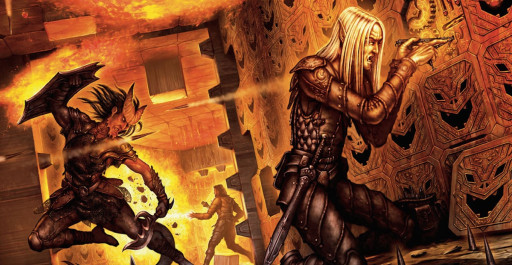
Git Gud. Unknown Artist.
Source: Player's Handbook
- You gain proficiency in any combination of three skills or tools of your choice.
From a non-combat standpoint, rogues are some of the most skilled characters in the game. They start with a whopping *4* skill proficiencies, not to mention any they acquire from their background. Plus, they get expertise, which doubles the proficiency bonus on some skills.
But you know what’s even better than 4 skill proficiencies? How about 7!
Throw in reliable talent - which gives you a minimum roll of 10 for all proficient skill checks - and you simply can’t fail! Well, you can still fail, but it certainly won’t feel like it!
Why Skilled Is Great For Rogue:
- Do more stuff better: As a rogue, you’re already expected to be good at a lot of stuff. Why not be good at even more stuff?
- Built-in excellence: This class simply hands you reasons to have more skills. Between expertise and reliable talent, there’s simply no reason to not get more skill proficiencies when you can.
- Turn more of your failures into successes: use this to bolster your worst or most vulnerable skills, and feel yourself start skating through the game.
5. Piercer

En Garde! Art by Anna Podedworna.
Source: Tasha's Cauldron of Everything
- You have achieved a penetrating precision in combat, granting you the following benefits:
- Increase your Strength or Dexterity by 1, to a maximum of 20.
- Once per turn, when you hit a creature with an attack that deals piercing damage, you can re-roll one of the attack’s damage dice, and you must use the new roll.
- When you score a critical hit that deals piercing damage to a creature, you can roll one additional damage die when determining the extra piercing damage the target takes.
As I’ve said before, Sneak Attack is one of the rogue’s most important features. Not to mention one of the most iconic - it’s that moment that you deal your epic final blow. Or blow your enemies knees out from under them.
The last thing you want is to roll your much-anticipated sneak attack….and hit all 1s. Or even mostly 1s. This feat fixes that, by allowing you to re-roll one of your dice. Plus it applies to the extra dice you get from a critical hit, too.
The requirement of piercing damage is fairly negligible for rogues - piercing is practically the rogue damage. Rapiers, daggers, bolts, and arrows are standards for most rogues.
The one downside here is that the advantage of this feat powers down as you level up. When you’re rolling 8d6, changing one feels pretty insignificant. But you aren’t rolling 8d6 until level 15, so if you’re starting low, this feat will be meaningful for a while. And even if you aren’t, it still does make a difference (even if it doesn’t feel like it as much).
Finally, that extra point in DEX (or STR, but let’s be honest, you aren’t putting it there) is a tasty cherry on top.
Why Piercer Is Great For Rogue:
- Optimized sneak attack damage: Turn those 1s into (hopefully) 6s on your sneak attack damage. And your regular damage!
- Don’t alter your build: chances are, you’re already using piercing damage. So, this feat folds in quite nicely.
- DEX! DEX! DEX! DEX! More dex!! Rogue = Dex. C’mon. More dex = more rogueishness, always and forever.
4. Alert
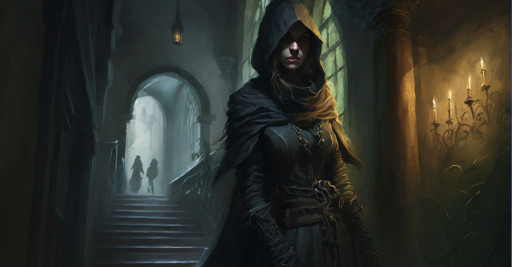
I know you’re there. Art by Mark Williams-Cook.
Source: Player's Handbook
- Always on the lookout for danger, you gain the following benefits:
- You can't be surprised while you are conscious.
- You gain a +5 bonus to initiative.
- Other creatures don't gain advantage on attack rolls against you as a result of being unseen by you.
This feat is less about specific rogue features and more about your role in general in combat. Where you attack from, who you attack, when, and why are very important factors in causing the most damage. And as a DPS, you want to cause the most damage.
Not being surprised and getting a +5 to your initiative both help significantly with this. You can make sure you’re exactly where you need to be in battle. Both for your sneak attacks, but also for whatever the rest of the party has in mind.
Not to mention, a couple good hits on the right targets can turn a deadly battle into simply a difficult one.
This is especially true of the Assassin subclass. With this subclass, you get advantage on creatures that haven’t taken any turns in combat yet. Aka sneak attack right off the bat, no extra positioning or bonus action hides required.
Also, as a big damage dealer, you may become the target of an unseen enemy, hoping to catch you off guard and take you out early. Joke’s on them- just because you can’t see them doesn’t mean you’re going down quickly.
Why Alert Is Great For Rogue:
- Perfect positioning, every time: With +5 to initiative and incapable of being surprised, you can make sure you’re exactly where you need to be when combat starts. Practically before it starts!
- Take them out quick - 5 enemies, even weak ones, are a lot deadlier than 4. Going early in combat as a rogue means helping reduce their numbers. Maybe even before they get to go.
- Assassins’ Dream: The assassin class is all about getting the jump on your enemies. Being alert makes this even more likely, and therefore even more useful.
3. Skulker
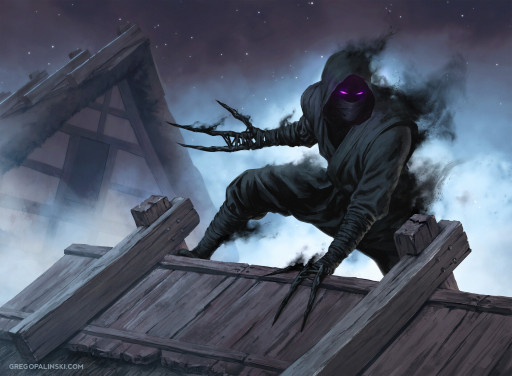
Borne of darkness. Art by Greg Opalinski.
Source: Player's Handbook
- Prerequisite: Dexterity 13 or higher
- You are an expert at slinking through shadows. You gain the following benefits:
- You can try to hide when you are lightly obscured from the creature from which you are hiding.
- When you are hidden from a creature and miss it with a ranged weapon attack, making the attack doesn't reveal your position.
- Dim light doesn't impose disadvantage on your Wisdom (Perception) checks relying on sight.
Hiding is everything. You use it to gain sneak attack in combat. You use it to get your party into castles. You use it to gather crucial information. You use it to stay safe when a tough baddie is onto you.
So, why not get better at it, and enhance everything about your game? Being able to hide when lightly obscured is huge. We’re talking “batman-disappears-from-beneath-your-nose” huge. “lightly obscured” is everything from dim light to moderate foliage.
Everyone knows you’re stealthy. But now they can’t keep track of you, even when they had eyes on you just a second ago!
Also, you can swing from the shadows and not give yourself away if you fluke. If you don’t fluke, you’ll most likely do sneak attack damage, taking them down a good chunk (if not all the way), and therefore giving yourself a good chance of survival.
But if you miss? Normally, you’d better start running. Now, you can just keep still, and wait for a chance to swing again - no harm, no foul (yet. Obviously you want to eventually harm and also foul).
And, you have a little bonus of getting to keep an eye out easily, even in dim light.
Why Skulker Is Great For Rogue:
- Disappear beneath their noses: Hiding when lightly obscured means getting out of trouble even more easily - like disappearing just because it’s dark out! And it means sneak attack for it, too!
- Listen to the intrusive thoughts: Are you hidden with the perfect opportunity for a headshot? But if you miss, they’ll find you, and you’re screwed? Don’t think about it anymore! Listen to the devil on your shoulder, and take the shot. Even the angel agrees now!
- Adopt the darkness: Okay, so you’re hiding in dim light, and attacking from it. What about other people in the dim light? No problem! You can see them just fine. Just don’t fight bane head on, please.
2. Actor
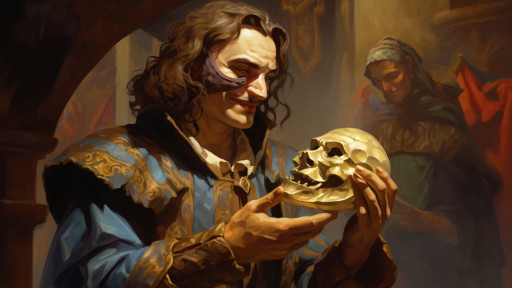
To crit, or not to crit? That is the question. Art by Dice Cove.
Source: Player's Handbook
- Skilled at mimicry and dramatics, you gain the following benefits:
- Increase your Charisma score by 1, to a maximum of 20.
- You have an advantage on Charisma (Deception) and Charisma (Performance) checks when trying to pass yourself off as a different person.
- You can mimic the speech of another person or the sounds made by other creatures. You must have heard the person speaking, or heard the creature make the sound, for at least 1 minute. A successful Wisdom (Insight) check contested by your Charisma (Deception) check allows a listener to determine that the effect is faked.
The other side of rogues - besides sneak attack - is stealth. You’re the party sneak, the thief, the assassin, the spy.
Of course, ideally, you’re in the shadows. But what do you do when the shadows fail you? Or you fail your stealth check?
It’s fairly simple - deception. Fake your way out of trouble. Lie, mimic, deceive, anything you gotta do to keep your hide (pun intended). And, of course, try to get as much loot in the process.
Actor is perfect for this. It starts by boosting your CHA, which you’ll need for deception and performance checks in your process of faking. Then, it even gives you advantage on these checks, if you’re pretending to be someone else.
Suddenly you’re a lot better at convincing the scullery maid you’re a noblewoman who just arrived at the mansion. And that she should be ashamed for not treating you with respect! Then when she goes to the lord to announce your presence, you can grab the treasure map and scoot out of there.
Finally, it allows you to mimic sounds and voices you’ve heard for a minute. Send secret signals via perfect bird calls! Or shout “I’m okay!” in the voice of the man you’re murdering, when his friend knocks on the door you’re being.
Bam. Rogues.
Why Actor Is Great For Rogue:
- Better lying: Lies are foundational to rogues. Now you’re even better at them!
- Better disguises: Get yourself out of hot water, or into important events, with perfect acting skills.
- Useful mimicry: With a little creativity, the ability to imitate sounds and voices goes a long, long way. At *least* as long as your rapier.
1. Mobile

Can’t touch this. Art by Jesper Ejsing.
Source: Player's Handbook
- You are exceptionally speedy and agile. You gain the following benefits:
- Your speed increases by 10 feet.
- When you use the Dash action, difficult terrain doesn't cost you extra movement on that turn.
- When you make a melee attack against a creature, you don't provoke opportunity attacks from that creature for the rest of the turn, whether you hit or not.
This feat is a little less sneak-attack direct, and it grants you an overall class boost as a result. It’s not about your damage dice, or attack rolls. It’s about your positioning and mobility.
There are two basic ways to get sneak attack. First, when you land a hit that you rolled with advantage. Two easy ways to get advantage are to hide, or to have an ally across an opponent from you (if your DM allows flanking rules).
Enhanced mobility can significantly help with both of these - getting to a place where you can hide, or getting to the other side of an opponent.
The second way to get sneak attack is a little more complex. Put simply, if your target’s enemy (not including you) is next to it, and you don’t have disadvantage, you can get sneak attack if you hit.
Once again, being mobile is useful here - get up close to an enemy that your ally is currently fighting, and you’re good to go!
Even better, though, is what happens after your attack. Especially if you hit, you probably want to get out of range. (You’re not as bad as wizards, but with a d8 and only light armor proficiency, you aren’t exactly a tank).
Guess what? You can! Made the swing? Doesn’t matter if you hit or not. You can GTFO without provoking opportunity attacks.
Hit-and-run to your little dark heart’s content, Mr. Rogue.
Why Mobile Is Great For Rogue:
- Easier sneak attack positionings: Get to your hiding spot, or to another place where you’ll get to sneak attack, without issue.
- Hit-and-run mode = on: Run in, swing, and run out - no hit needed to get away safely!
- Better dashing: Chances are, you’re using your bonus action dash a fair amount. Now you can go farther - both with the increased movement speed, but also by ignoring difficult terrain. Fun!

